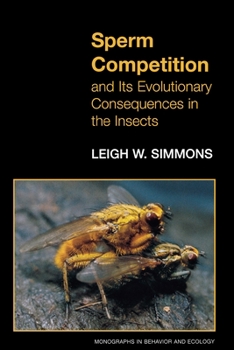Sperm Competition and Its Evolutionary Consequences in the Insects
Select Format
Select Condition 
Book Overview
One hundred years after Darwin considered how sexual selection shapes the behavioral and morphological characteristics of males for acquiring mates, Parker realized that sexual selection continues after mating through sperm competition. Because females often mate with multiple males before producing offspring, selection favors adaptations that allow males to preempt sperm from previous males and to prevent their own sperm from preemption by future males. Since the 1970s, this area of research has seen exponential growth, and biologists now recognize sperm competition as an evolutionary force that drives such adaptations as mate guarding, genital morphology, and ejaculate chemistry across all animal taxa. The insects have been critical to this research, and they still offer the greatest potential to reveal fully the evolutionary consequences of sperm competition. This book analyzes and extends thirty years of theoretical and empirical work on insect sperm competition. It considers both male and female interests in sperm utilization and the sexual conflict that can arise when these differ. It covers the mechanics of sperm transfer and utilization, morphology, physiology, and behavior. Sperm competition is shown to have dramatic effects on adaptation in the context of reproduction as well as far-reaching ramifications on life-history evolution and speciation. Written by a top researcher in the field, this comprehensive, up-to-date review of the evolutionary causes and consequences of sperm competition in the insects will prove an invaluable reference for students and established researchers in behavioral ecology and evolutionary biology.
Format:Paperback
Language:English
ISBN:0691059888
ISBN13:9780691059884
Release Date:December 2001
Publisher:Princeton University Press
Length:456 Pages
Weight:1.45 lbs.
Dimensions:1.1" x 6.1" x 9.2"
Customer Reviews
0 rating





